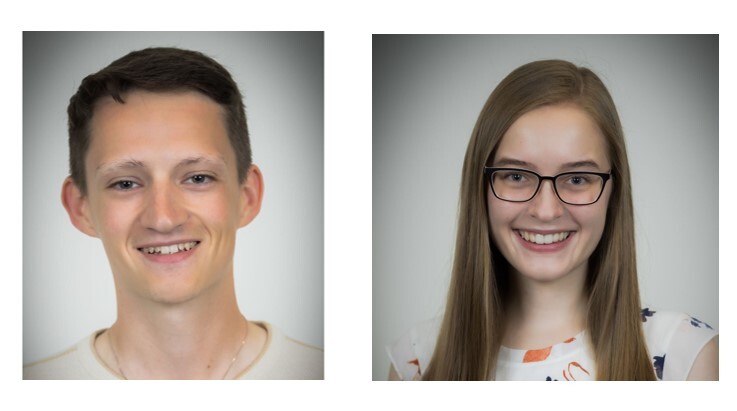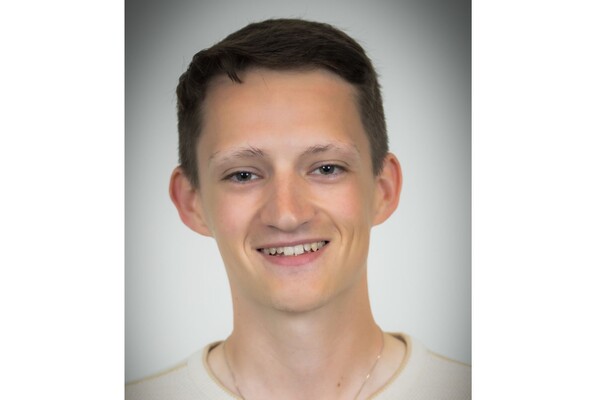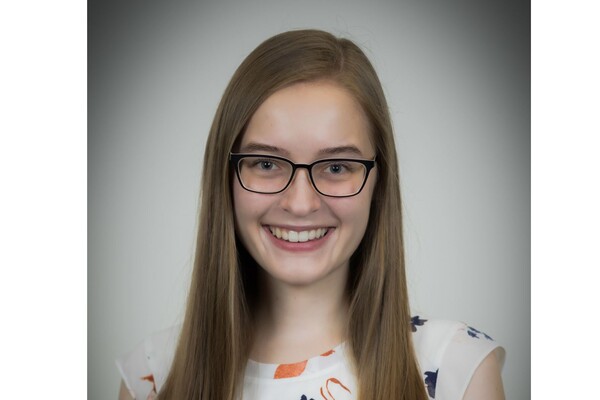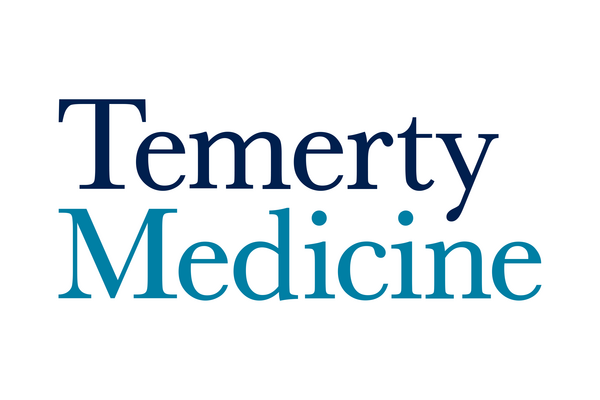Introducing Chad Turner and Rachel Stubits
Admissions Committee Student Representatives, 2023-2024

We’d like to introduce you to this year’s Admissions Representatives Chad Turner and Rachel Stubits, both from Mississauga Academy of Medicine. During the 2023-2024 academic year, Chad and Rachel will be involved with the recruitment programming offered in our Enrolment Services office, delivering presentations and speaking to prospective applicants, coordinating interview days, producing our MD admissions video and more!
In their capacity they will also serve as student representatives for the MD Program Admissions Committee and be involved in various aspects of the recruitment and admissions process. They will be providing a student perspective to and voting on admissions policies and evaluating applicant files. Here’s what they both have to say about their personal journey to medical school and what the student experience has been for them so far.

Where did you attend for your undergraduate studies and what was your major?
I attended the University of Prince Edward Island for my undergraduate studies, where I majored in Chemistry and minored in Biomedical Physics. I learned about the field of Medical Physics late and wanted to learn more, so I then completed a Master of Science in Medical Physics at McMaster University in their Radiation Sciences Graduate Program (RadGrad). If you’re wondering how much of that content has come up again in medical school, the answer is not a lot. Jokes aside, the curriculum design and learning environment at U of T have made the transition to learning medicine much easier than I had anticipated. The frequent, small assessments are great for reconciling information quickly after learning it and the remarkable support of our classmates and faculty ensure that you never feel left behind.
Why did you decide to become a Student Admission Representative?
Growing up in a more rural area of Canada without a medical school, I was always interested in how the admissions process can be made more accessible and equitable for individuals from various geographic and social backgrounds. I am passionate about ensuring that prospective applicants who would be exceptional physicians are not disadvantaged in the current highly competitive admissions process due to limited access to appropriate resources or opportunities.
When applying to the University of Toronto MD program, I found their process to be holistic and it allowed applicants to speak considerably of their personal experiences and circumstance. Becoming a Student Admission Representative allows me to work with the Admissions Committee to further their commitment to finding the best future physicians for the program. Although I am new to the role, I’ve been extremely encouraged to see their desire to listen to student voices and innovate ways to improve the accessibility to medical school for everyone. I can’t wait to delve in further!
Why did you choose University of Toronto for medical school?
The short answer is that the University of Toronto is the only MD program that accepted me, but perhaps I can convince you why there is no other place I’d rather be.
First, Toronto is home to some of the most advanced and cutting-edge medicine on the planet. As students, we can get first-hand experience learning directly from experts in any specialty, sub-specialty, or sub-sub-specialty in medicine. We have access to some of both the best academic hospitals in the world and the largest community hospitals in the country. I feel as though I have entered the epicenter for learning opportunities.
Second, the curriculum design is top-notch. In clinical skills, we learn how to take patient histories and perform physical exams. I was impressed at how quickly we were able to interact with real patients on the wards and at the amount of time spent refining our skills with standardized patients. Between time spent with real patients and longitudinal lectures teaching us how to be better advocates and practice compassionate care, we really get to learn the art of medicine in addition to the science. When learning the science, we have a roughly 50/50 split between time spent in class and time spent with self-learning material. This allows us to take advantage of world-class lecturers in person while also giving us flexibility to study on our own preferred schedule. The flexibility has allowed me to spend plenty of time studying with classmates and participating in extracurricular activities. Our tests, known as Mastery Exercises or MEs, are frequent but low-stress and low-stakes. As opposed to having to study a semester’s worth of material at once, we can consistently reconcile each week’s material without having to think far back at old material or far ahead at a large test. If you have a bad week or life gets in the way, it is easier to jump back on board with this design. Furthermore, the curriculum is “spiraled” over the 4 years, meaning that we have spaced exposure to the same material for better recall and understanding.
Lastly, and perhaps the most important, is the people. Your peers, the administrative staff, and the faculty are all incredible and wish you nothing but success. If you are struggling, the program will provide you with individualized supports through the Office of Learners Affairs to get you back on your feet. These supports can be anything from Financial Aid Officers to Personal Mental Health Counsellors to Academic Skills Coaches. You get to meet your best friends, future colleagues, and fantastic mentors while being supported by a program that strives to make you the best physician you can be.
If you’re still not convinced that the Temerty Faculty of Medicine is the place to be, check out my friend Rachel’s blog post here for an even deeper dive into all the amazing aspects of the MD program.
What do you wish you knew before you went to medical school?
There is a lot of stress, a lot of doubt, and a lot of comparing yourself to others on the pathway to medical school. This meant that when I finally entered medical school, I had a lot of misconceptions about what it would be like. For instance, I thought it would be competitive, I thought I would have to get the highest grades, and I thought it would be unforgiving. I also thought the traffic on the QEW would be reasonable. None of those beliefs were correct, and one of them was very wrong.
Instead of trying to outperform others, everyone is trying to lift each other up. Grades don’t appear on transcripts and being at the top of the class no longer matters. What matters is that you are dedicated to becoming the best physician possible. Sometimes, for example, this may involve sacrificing a few marks on a test to partake in an experience with a mentor. It may also involve taking time to help a classmate with an initiative or simply taking more time to sleep so you can be ready for the next day.
I also wish I understood the importance of maintaining healthy habits and how this seemingly small effort can help build resilience and lead to better experiences. In undergraduate studies it was more viable to have less than ideal study habits or sleep schedules, as the consequences did not extend far beyond me. In medical school, however, I want to remain motivated and go the extra mile for both my peers and future patients. For me, this is made much easier when I have maintained good habits, even with a busy schedule.
Has there ever been a time or circumstance that confirmed your decision to pursue a profession in medicine/ to become a doctor?
When I was in elementary school, I started to learn about my grandfather’s military service during WWII for a heritage fair project. He had worked on a hospital ship when he was only a teenager, and my research led me down a pathway of learning about healthcare during wartime and some of the different healthcare professions. Entering high school, I thought I may become a medic in the military, but I ended up developing a very strong interest in the natural sciences that directed me towards medicine and lots of years of school (no regrets, by the way). Now enrolled in medical school, my decision to pursue a profession in medicine is confirmed every day. I’m early-on in my training, but I have the massive privilege of interacting with and learning from patients. Being able to offer a compassionate ear and learn how to care for people on some of their worst days has only made me more motivated. I am excited for the future and can’t imagine anything else I’d rather do. As an added bonus, I was also able to join the military through their Medical Officer Training Program and satisfy my desire to become part of yet another organization that has been a background influence for much of my life.
If you had to start over as a pre-med student, would you do anything differently?
While I had intended to pursue a career in medicine since high school, I didn’t have any family, friends, or mentors who had gone through the process of becoming a physician. As such, I can honestly say I didn’t fully appreciate the competitiveness of getting an acceptance to medical school until the second or third year of my undergraduate degree. This came with advantages and disadvantages.
When choosing my undergraduate program, my only criteria was that I would enjoy it. I figured that if I couldn’t get to medical school by doing things I enjoyed, then maybe medical school wasn’t for me. Jump forward 6 years - I loved my undergraduate studies and it led me to an amazing master’s program. If I hadn’t been genuinely invested in my first degree, I don’t think I would have ended up enjoying my master’s program, nor would I have been able to perform as well. That being said, I did take some elective courses that resulted in some BAD marks because I let my interests win over my GPA.
In the end, I’m very happy I was able to get here purely by following my passions, but I’m sure there was a large element of luck on my side too. If I were to change something, I would have spent more time exploring extracurricular activities earlier on in my undergrad. Getting involved in school clubs or organizations in your local community is an excellent way to develop skills, meet others, and become a more well-rounded individual.
What do you enjoy doing in your spare time?
Originally, I thought I would have to put aside many of my hobbies once starting medical school. I am happy to say that this hasn’t been the case. It can be busy balancing school with extracurriculars, but it is not only possible but encouraged. Rock climbing, intramural soccer, drop-in badminton, and attending the various (but optional) medical skills workshops offered at the University of Toronto are a few activities that I enjoy. I was also able to continue with a volunteer position I had started prior to medical school and start a new volunteering position. Recently, I have also had a wonderful time helping new students as they get welcomed to medical school.
Do you have any advice to give to prospective applicants?
Frankly, there are a lot of people who are more qualified to give advice than myself, but I will do my best. I would say that while there are certainly more common pathways to medicine, recognize there is no single way and no right way. Pursue your passions, aim to exceed in school, and seek out opportunities outside of your comfort zone that push you to develop as a person. It can be easy to become distracted by the draw of “prestigious” jobs and research opportunities, but they are not a prerequisite for acceptance nor are they available to everyone. For instance, I learned a ton about communication and leadership while working at a movie theatre for six years while in school. I also found it much easier to remain motivated and perform well when I was taking university courses for which I had a genuine interest. The same goes for participating in extracurricular activities that I genuinely care about. I recommend this approach as opposed to trying to check off any boxes you may think make the “best” applicant. Spending time doing things you are passionate about also helps with remaining patient – the path to medicine can be grueling, and you owe it to yourself to pursue it in a way that is healthy, enjoyable and supports your own wellbeing and happiness.

Where did you attend for your undergraduate studies and what was your major?
I completed my undergraduate studies at the University of Toronto Mississauga (UTM) campus between 2017 and 2022. During this time, I specialized in Molecular Biology and minored in Chemistry. I chose this area of study because I was (and still am!) fascinated with genetics.
After graduating from UTM in 2022, I was fortunate enough to continue my studies here as a student in the Mississauga Academy of Medicine (MAM) in the class of 2T6. By the time I graduate from medical school, I will have been a UTM student for 9 years! Chad recently joked that I’m a “UTM Lifer”, which is definitely a compliment, because UTM is the best. I am very grateful to have been a member of the UTM community for so many years because it’s an incredible place to learn and grow.
Why did you decide to become a Student Admission Representative?
Before I even applied to medical school, one of my goals was to eventually contribute to admissions policy decisions, especially as they pertain to students with disabilities. I believe that the best physician workforce is one that fully represents the population it serves. Sadly, people with disabilities comprise one of the groups that have largely been excluded from medicine.
I am proud to say that the Temerty Faculty of Medicine has championed many initiatives that make medicine more accessible to all students, including those with disabilities. This includes the Community of Support, OMSAS Disability-based Consideration Requests, and the Medical Student Accessibility Network (MSAN). I hope to help implement more solutions as we work toward a future where all students with disabilities are fully supported throughout their journey in medicine.
Why did you choose University of Toronto for medical school?
I wrote a full blog post answering this question, which I would encourage you to read!
What do you wish you knew before you went to medical school?
During the summer before I started medical school, I had many questions about what my education would look like. I read through the Temerty Faculty of Medicine website and connected with upper-year students to learn more about the program. However, in hindsight, I realize that all of my questions would have been answered in due time during Orientation Week and throughout the first few lessons of the school year. This is one of the many aspects of the UofT MD Program that I appreciate: the faculty does an excellent job of communicating with students and ensuring that we are all on the same page. I would encourage any incoming students with unanswered questions to reach out to faculty or upper-year students, but to also remember that the program will get you up to speed on everything you need to know.
Aside from this, I held one major misconception prior to starting medical school: I imagined that pre-clerkship would be incredibly difficult in comparison to my undergraduate studies. I was very intimidated and worried that I would not be able to handle the academic rigor. I am happy to say that my fears did not come true. In reality, the intensity of the pre-clerkship curriculum is roughly in the same ballpark as my undergraduate studies. I wish that I knew this before medical school, because it would have set my mind at ease.
Has there ever been a time or circumstance that confirmed your decision to pursue a profession in medicine/ to become a doctor?
Every time I interact with patients through clinical skills sessions or shadowing experiences, I am reminded of why I love medicine. It is truly an honour to support and accompany patients through some of the best, worst, and most important moments of their lives. I feel privileged to hear patients’ stories and – especially at this stage of my training – learn from them. Additionally, I am very happy that medicine is a team sport; I love working with other people. As a student, it is very rewarding to see my amazing classmates work toward becoming the best future physicians that we can be.
If you had to start over as a pre-med student, would you do anything differently?
Hindsight is 20/20, and while I do not have any major regrets about my undergraduate studies, there are a few things I might do differently if I had to start over. Firstly, I wish I had taken more electives outside of my programs of study (Molecular Biology and Chemistry). My undergraduate degree was a limited time in my life where I had the opportunity to learn just for the sake of learning. I certainly could have been more consistent in sampling electives from all different fields, simply because they sounded interesting to me. On the occasions where I did this, I had so much fun, I made new friends from other fields of study, and I learned a lot.
Secondly, if I needed to start over as a pre-med student, I would spend more time studying with friends. During my undergraduate studies, I thought that I would be more productive if I studied alone, so I typically stayed home or worked in the quiet section of the library when I wasn’t in class. I made the conscious effort to try a new strategy during medical school, and it has worked extremely well. Now, I spend more time reviewing material with friends on campus. I work more productively when I have classmates to hold me accountable. Also, we learn a lot by helping answer each other’s questions. I cannot recommend routine collaboration with classmates highly enough.
Lastly, I would like to share one of the things I would do the same if I was an undergraduate student again. Perhaps the main reason why I had so much fun during my pre-med journey is because I focused on pursuing what I loved, enjoyed, and was truly passionate about. I didn’t try to choose a program of study or activities that I thought a pre-med student “should” do, because that idealized path simply doesn’t exist. The best thing you can do for yourself is to give yourself permission to do what you love.
What do you enjoy doing in your spare time?
I am happy to say that I am participating in several extracurricular activities during this (my second) year of medical school. In my spare time, I love to spend time with friends and family, try new restaurants, read, sing, and go for walks or bike rides in nature. I’ll take this opportunity to tell you about a few of my favourite things, and some hidden gems near MAM:
- The vegan-friendly chocolate chip cookie dough (which is safe to eat raw) from Little Rose Cookie Co. in Streetsville is my favourite dessert ever.
- Daughters of the Deer by Danielle Daniel is an incredible book and a must-read.
- It’s always fun to walk up Principal’s Road or along the UTM Nature Trail to see Lislehurst near Halloween – the decorations are incredible!
- The salmon run along the Credit River is my favourite time of year. In September and October, I spend countless hours walking along the Culham Trail, reading books near the river, and sending my friends way too many videos of the fish as they swim and jump upstream.
Do you have any advice to give to prospective applicants?
My most important piece of advice for prospective applicants is to tailor your pre-med journey to your own passions and interests. Life is too short to do anything other than what brings you joy. You don’t need to be a “traditional” applicant to succeed, and there is no ideal pre-med pathway that you need to follow. I want to wish you the best of luck on your application journey, and I hope to meet you one day!

